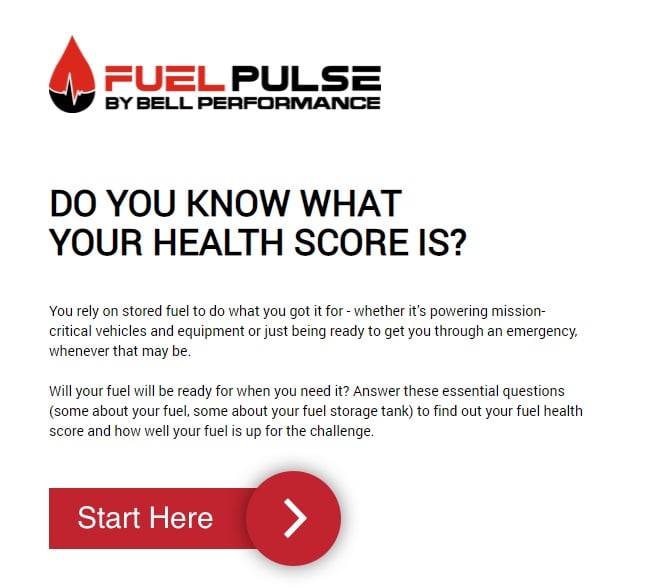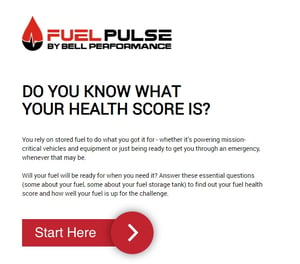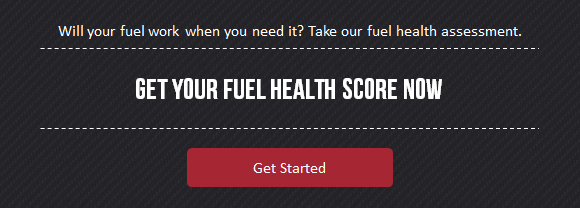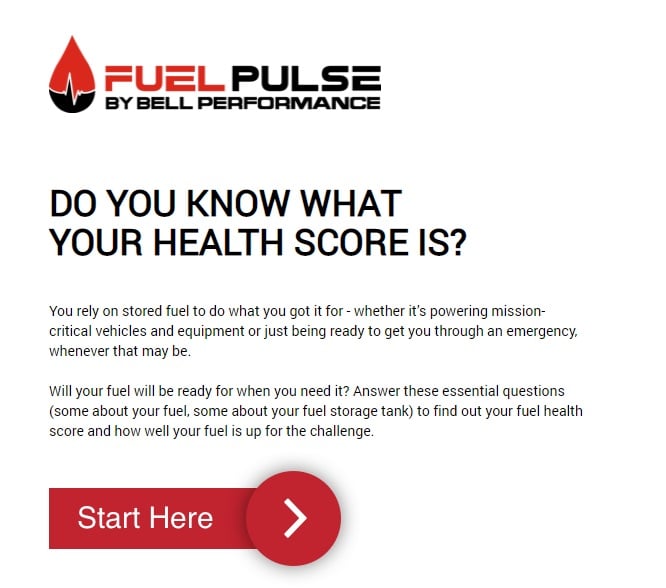What’s Your Fuel Health Score? The Webinar Transcript Part 3
As a service to our customers, dealers and friends, Bell Performance hosts quarterly webinars on fuel topics of interest to their friends and their...

As a service to our customers, dealers, and friends, Bell Performance hosts quarterly webinars on fuel topics of interest to their friends and their customers. This is a transcript of one of these recent webinars called What’s Your Fuel Health Score? We will be publishing it as a multi-part series. If you would like to watch the archived presentation, please click here.
 Welcome to our webinar today on what's my fuel health score. I am Erik Bjornstad, I am the technical information director here at Bell Performance, and today we want to talk today about stored fuels. The way the stored fuel has changed in the last 10 or 20 years, it's become more important than ever to maintain that fuel.
Welcome to our webinar today on what's my fuel health score. I am Erik Bjornstad, I am the technical information director here at Bell Performance, and today we want to talk today about stored fuels. The way the stored fuel has changed in the last 10 or 20 years, it's become more important than ever to maintain that fuel.
But the trouble is, there's just so much information out there on what you should be doing and what you shouldn't be doing. It can kind of get overwhelming. You know, the Internet is great. It's fundamentally changed our society and also the way everyone does business, to the point where we wouldn't dream of not being able to find out almost anything we think that we want to know and we expect to have that information at our fingertips at a moment's notice. In fact, it's gotten to the point where we sometimes feel almost aggrieved if we have to wait more than three seconds for a particular webpage to load.
What happens when we get overloaded with all this information? I mean, have you ever gone into a restaurant and they bring you a menu that looks like a doctoral dissertation of food choices?
I remember my wife and me going into a Cheesecake Factory and they hand you this menu and you're just swamped with all these choices. Not even counting, you know, the 40 different kinds of cheesecake they have. Actually, marketing professionals in the restaurant industry are coming around to the idea that maybe having a menu that weighs 12 pounds may actually hurt their food sales. Because it gets to the point where it makes it more difficult for people to make decisions.
That is what the research shows in all areas across the spectrum. The more information, the more choices you have, even if it happens to be the right information, the more difficult it becomes to make decisions. Whether it's picking something from the menu at a restaurant or trying to settle on the right solution to some kind of problem in some fuel that you might be managing.
So it's not always the best thing to be overloaded with information. And that's even if the information that you have happens to actually be the right information. Because there's a lot of bad information out there. And if you're not a fuel expert, then it can be difficult to tell what's accurate, what's good information versus what's not.
That is where we come in here at Bell Performance. We've always tried to connect people with the right information to help them with whatever their problems are. Sometimes people need someone to help them, guide them through the noise to the point where they can find what they need to make the right decisions for them and whatever problem that they're facing in stored fuel.
Speaking of that fuels, yes, stored fuel today has more problems than ever before. What's more, think about the number of storage fuel storage tanks that there are. There are hundreds of thousands of fuel storage tanks all across the country. One thing that's common to a great majority of them is the stored fuel contained inside is out of sight, out of mind. You know it's in there, but you never know exactly what's going on with it because it is out of sight, right? So it's nearly impossible to know the fuel's true condition unless you happen to be one of the few that does follow certain best practices like rigorous condition monitoring of that fuel.
What we're going to do today is we are going to talk about an online tool that's been developed called the Fuel Pulse Health Check tool or Fuel Health Check tool. Sometimes it's referred to by that name. It's an online tool that asks a series of questions that touch on things that are known, relevant characteristics, and influences on stored fuel, health, and storage tank health. Then it takes whatever answers you give and it boils them down into a projection of what the health of that stored fuel might be. So this is the Fuel Pulse Health Check tool.
In our time together today on this webinar, we're going to run through the online tool. We're going to talk about the questions that it asks, of which there are 12. We're going to discuss why these questions matter when it comes to predicting or assessing the health of stored fuel and storage tanks. And also what the significance of some of the answer choices might be. Why are we asking these kinds of questions? Then at the end, we'll talk about the results that you're going to get, what those results mean. Because you have to know what this kind of thing means or else it's not useful.
So let's start at the beginning with the online tool. It is located at a landing page – https://www.BellPerformance.com/fuelcheck. When you go to that, this is what you see - this is the front page. It has this introduction here, if your question is whether your stored fuel is going to be ready when you need it, that's what the Fuel Pulse Health Check tool aims to give you a better idea of.
As you go through the tool, you're going to answer a series of multiple-choice questions on what you know about both your fuel and your storage tanks. And then at the end, the tool's going to give you a score that reflects a projection of the health of your stored fuel and storage tank. These questions all have to do with things concerning whether your fuel, or whether you know, if your fuel, has changed condition for the worst, and the things that you are or are not doing to help prevent this. Of course, not all factors in this sphere impact stored fuel condition in the same way. So different answers, depending on what they are, are weighted differently and they're given scores. Then those scores are aggregated internally so that, when you complete the tool, at the end you're going to get this final score that's going to tell you this is your fuel health score. And then it'll give you an interpretation, to tell you whether that score implies that your stored fuel is okay, it's in good condition, or if there may be something that you might need to be concerned about.
Let's run through this and see how it works. You would start by clicking the red start button and you'll go to the first question. First question, have you pulled a fuel sample from your tanks in the last two months? As you can see, the question is multiple choice and you just select the choice that's most applicable to your situation with your fuel.
So this first question relates to stored fuel health because of the importance of monitoring the condition of your fuel. You know, if you're not pulling samples, if you're not checking on your fuel at any kind of regular interval, that can be a problem because that makes it a lot less likely that you're going to see problems with your stored fuel either while they're happening or in the beginning before they become really serious problems. Not checking your fuel is bad for your fuel's health and this first question pins down whether you have pulled the sample and examined the sample of your fuel in the recent past.
Of course, if you happen to find yourself picking option number four here - how do I pull a fuel sample - well, that that also is a problem in, in and of itself.
Once you've settled on a selection, you pick your choice and it stays highlighted in red. The system records the answer internally. And then you're ready to click the arrow here to the next question.
So we go to question number two. Has Your fuel's appearance or smell changed in the last few months? Now I know I said that all of these questions were multiple choice. I think this one actually is the only one that is what we would call the MultiOption, which means you can actually choose multiple options here, right? Because more than one of these choices might apply to you, so you select all the options that apply to your situation.
The reason why this matters for stored fuel health is any change in the visual appearance or the smell of the fuel - those changes are known to be strong indicators that something is happening, that has changed the condition of that fuel.
Typically when we're talking about or asking about a change in the fuel’s appearance, we're assuming that that appearance change is either that the fuel's gotten darker, like here, or that the fuel's gotten hazy or cloudy. If the fuel has gotten darker, that means that it's gone unstable, it's stratified. It's the heavy ends that are coming out of the solution, and that is not good for the condition of the fuel. If it’s hazy or cloudy, we're talking about the presence of suspended or emulsified water. If you have water in your fuel like this in this picture, we know it’s not good to have emulsified water, but it can also be a sign of something more serious that may be happening in your fuel like microbial contamination. The reason why this could be a sign of microbial contamination is because microbes during their biological life cycles produce things called biosurfactants and they basically create emulsions which they use to travel up into the fuel and consume elements of the fuel for a food source.
If you have emulsified water, that doesn't prove in and of itself that you have a microbe problem. But it can be a supporting sign that there might be one in there.
So to answer this question, you select all the options that apply to your situation, that apply to what you've noticed about the condition of your fuel. Here I've selected two options, which stay highlighted in red. So if your fuel's gotten darker than it used to be when you checked it, select that. If your fuel happens to be hazy when normally it's clear and bright like it's supposed to be, and then you select that. If it's got a funny smell, you select that because fuel is supposed to smell, you know, like fuel. It would have what we call a solvent smell. It’s not supposed to smell like rotten eggs or something like that. So if that applies to you, you select that too. What if you don't really know because you haven't pulled any samples in, you know, x number of months. Well again, if you're not pulling samples and checking your fuel on a regular basis, then you're much less likely to be able to see problems when they're happening or before they turn into serious problems. And again, that's bad for your fuel’s health.
Okay. Question number three. The last time you did pull a fuel sample from the bottom of the tank, was there any solid material in the sample?
What kind of solid material are we talking about here? When you pull from a typical tank, when a bottom sample is pulled, and let's say you get a fuel phase and you pull some water bottoms, and maybe you pull some of this stuff here, which is what we would call a rag layer.
Well, what is this stuff? This stuff is microbial biomass or biofilm. It's the biological material that microbes produce during their life cycles. It can stick to internal tank surfaces and components. And if the microbial infestation is high enough and they're producing enough of this kind of stuff, then it can get to the point where there's enough of it that when you pull a sample, it will break off and it will actually go into your sample and then you can see that it's there. So if there’s solid material contaminating your fuel sample, it's likely to be either microbial biomass, it's likely to be possibly some petroleum solids, or sludge mixed in there. There's also a chance that some of that solid material could be the result of storage tank damage. And now we're talking about a serious problem. We're talking about rust from corrosion damage, and if it's serious enough, you can even get pieces of tank lining. If you've got a delamination problem, it’s mostly caused by microbes that can show up in there. So microbial activity in storage tanks has been known to be a key causal factor in both of these situations. If your fuel sample ends up with laminate and this kind of stuff in it, that's an overt sign to you that not only do you need to be concerned about the health of your fuel, but now your storage tank might also be facing costly damage.
If you find yourself answering yes to this question, there's a sign something's going on you need to deal with. Now one of these options here also talks about pulling a bottom sample versus pulling a middle sample. I think this one here, which reads I'm not sure as the last sample we pulled, it wasn't from the bottom of the tank. Now, best practices for condition monitoring of stored fuel always recommend pulling a bottom sample. If that's not what you've been doing, let's say you've been pulling samples, but you just in pulling them from the top, well that can be a problem because those samples, if they're not bottom samples, they're not really going to be what we might call ‘fully diagnostic’. They don't give you a representative picture of what's really happening in your tank because many of the problems that stored fuel have or end up developing, they end up being concentrated at the bottom of the tank. The signs of them end up being concentrated at the bottom of the tank and they may not show up in samples that have been taken from the middle or the top of the stored fuel.
In the next post, we will continue with Question #4 - changes in performance.


As a service to our customers, dealers and friends, Bell Performance hosts quarterly webinars on fuel topics of interest to their friends and their...

As a service to our customers, dealers and friends, Bell Performance hosts quarterly webinars on fuel topics of interest to their friends and their...

These days, people are trying to quantify everything, to come up with a number that tells them in simple terms what they think they need to know. It...